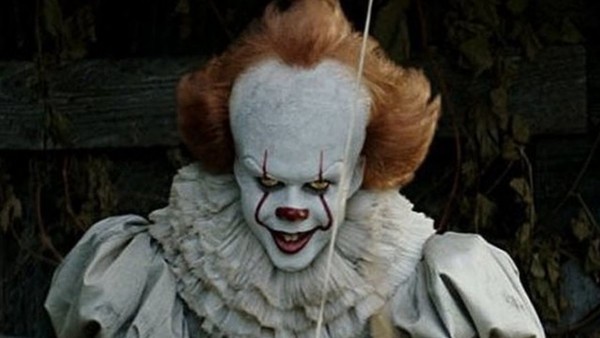The Disturbing Truth Behind Pennywise

Both Skarsgard and director Andy Muschietti spoke about Pennywise being disturbing because he is fundamentally unexpected and unpredictably. In the director's words: “Pennywise does things that make absolutely no sense, but they’re very disturbing because of the weirdness." Essentially, Pennywise is scary because unpredictability is scary. Stability, whether emotional or tangible is dependable and reassuring.
It's inherent draw comes from the fact that it's VERY EXISTENCE defies stability. It is a reimagining of the troll under the bridge in the Three Billy Goat's Gruff story. It is a revelation that everything that the people of Derry believed to be solid and stable - the very bedrock that they built their homes and lives on - is a lie containing something as dangerous as It.
The fact that It's favourite form is a clown is no accident either. It is as confident a form as it is perverse, which goes back to the idea of the fascination with John Wayne Gacy's murders. The typical idea of someone who would kill multiple people would be someone capable of blending in to hide themselves. For them to dress up ostentatiously as something as recognisable as a clown and to actively draw attention to themselves is the very epitome of unpredictability. Like Gacy, Pennywise's murderous intent SHOULD mean operating in shadow and not standing out.
For him to be a colourful, garish clown standing in a normal environment and still doing what he does is unthinkable. He doesn't fit any more than those creepy clowns belonged in our real world back in 2016. They were menacing not because they held some threat, but because they didn't belong. They too were unpredictable.
And again, it was something Bill Skarsgard channelled for his preparation to play the character. He's somewhat evasive when asked about that preparation, because of the threat of demystification, but we know that he was consciously removed from the kids on-set. Andy Msuchietti confirmed he separated the kids from Pennywise "to try to capture that first impression that first reaction" and while he's not a method actor, Skarsgard's method of warming up was disquietening too. He would live in this little black tent on set and then when he was preparing, out of the blue, the rest of the cast and crew would hear his creepy laugh.
The way Muschietti describes it is almost like Skarsgard himself were a force of fear:
"...And that’s where everybody shuts the f**k up. He comes in like a long shadow."
There's something to be said about the merit in authentic fear, even when it's part of a performance. That's why Stanley Kubrick was so happy to basically break the law in order to get a truly incredible performance out of Shelley Duvall in The Shining. There was nothing to say DuVall wouldn't be capable of performing well, but Kubrick took it a step further, enforcing method through what amounted to abuse. The results play out on screen in a morbid, fascinating way that it is almost too perverse to watch.
To his eternal, creepy credit, Bill Skarsgard decided on a similar approach to making sure he made a mark on the Losers' Club in far more than a disposable way. He did so - with help from the film-makers, of course - by building a mythology for the character and protecting it from being uncovered and demystified.
In a weird sort of way, just as It itself fed off the fear of the characters, Skarsgard's performance - like Jack Nicholson's in The Shining - fed off the authenticity of his co-star's emotions. That, in itself, begins to help explain exactly why It works so horrifyingly well as a character. Because fear is a hell of a currency. And because they didn't know what to expect from him, he ticked the unpredictable box too.